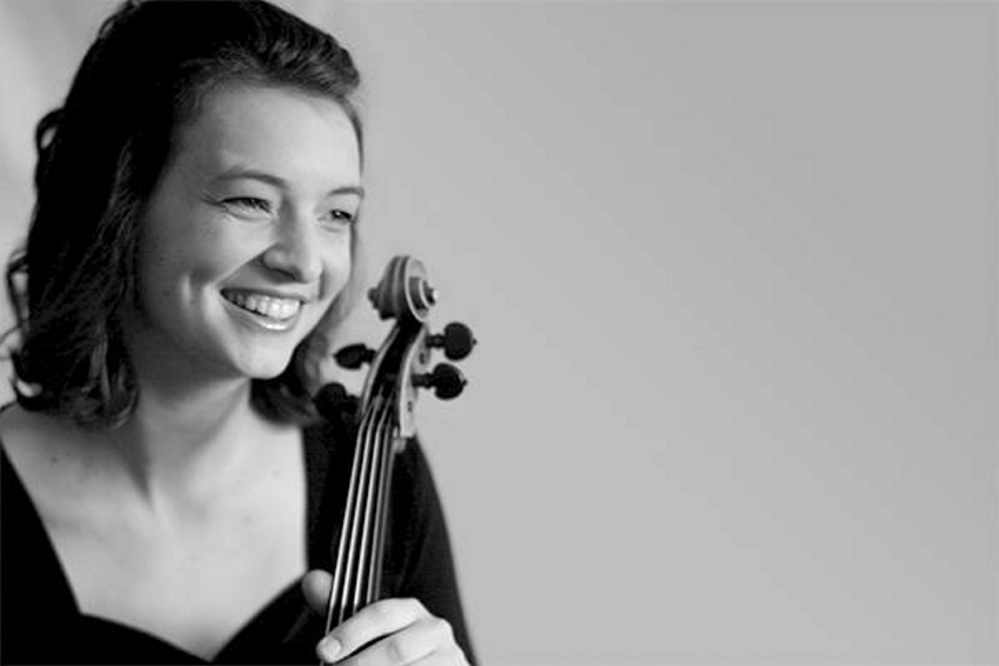The theme of this summer’s Bowdoin International Music Festival is Reinvention – or, depending where in the program book you look, (Re)invention or Re-invention. Philip and David Ying, the festival’s artistic directors (they are also the violist and cellist of the Ying Quartet), clearly intend the title to tell us something.
Now in the second year of their directorship, they presumably hope to reinvent this 52-year-old festival in their image, although so far, it does not look radically different. But when David Ying mentioned the theme from the stage of Studzinski Recital Hall, at the start of the festival’s opening concert Wednesday evening, he framed reinvention as part of the creative process and promised that the audience would witness some reinvention that very evening.
I can’t say whether we did, because I can’t pretend to know what reinvention means in this context. The three works on the program – Richard Strauss’ youthful Sonata for Cello and Piano in F major (Op. 6), Krzysztof Penderecki’s searing String Trio, and Mendelssohn’s impassioned, lush-textured Piano Trio No. 2 in C minor (Op. 66) – were exactly the works they always have been. Indeed, had they been reinvented, the performers would have failed in their interpretive mandate, since the hoped-for balance between fidelity and freshness, in classical performance, falls well short of reinvention.
So what is this about? The classical music world, in its terror of not seeming current and edgy, has become silly about naming concerts, series and festivals. The catchiness and marketability of the names it comes up with are usually inversely proportional to the substantive meaning that those names convey. Best to just look at the program book, shake your head sagely, exclaim “(Re)invention! Huh!” and never mention it again. Next summer, it will all be forgotten.
The titling thing ought not distract (except that it does) from the real business of this festival, which this year brings together 70 faculty musicians and 255 students from 27 countries for six weeks of study and performances. All told, there are 93 public events, including concerts, lectures and master classes. And if the energy and incisiveness that the faculty players brought to all three works on Wednesday is an indication, this should be an invigorating summer.
The Strauss, which opened the concert, is the work of a precocious 19-year-old who had absorbed the conventions of late Romanticism (he completed the work in 1883) but was only beginning to find his own compositional voice. Cellist Amir Eldan and pianist Tao Lin did a fine job of teasing out the melodic strands that Strauss wove into the thick textures of the opening Allegro con brio, a bravura movement in which the two instruments are almost melded into a single texture. Once the cello takes the spotlight, in the central Andante ma non troppo and in the alternately playful and sober Allegro vivo finale, Eldan shaped it with a singing tone that emphasized the score’s emotionally taut underpinnings.
If you’re looking for startling contrasts, you could hardly do better than to follow the Strauss with Penderecki’s String Trio. In the opening pages of this 1990 work, bursts of harsh, repeated chords punctuate soliloquies by the viola, cello and violin, each a distinct, sharply drawn character in what sounds like a polemical debate. A more unified dialogue follows, leading into a fugal second movement that unfolds with relentless drive. Violinist Ayano Ninomiya, violist Rebecca Albers and cellist David Requiro dug into the tense, sometimes abrasive score, and projected it as an edge-of-the-seat thriller.
After the intermission, David Ying took up his cello, joined by violinist Sergiu Schwartz and pianist Pei-Shan Lee, for a steamy but nuanced account of the Mendelssohn. A peril of the festival setting is that performances by players who have just joined forces can have an ad hoc quality. Not here. This was a brisk, supercharged performance, executed without strain and without the compromises that can make one-off performances seem carefully bland.
But perhaps the most telling movement was the lightest: In the Scherzo, the playing was not only nimble and fleet, but conveyed that otherworldly sense of fantasy that is Mendelssohn at his best. It’s a quality you wouldn’t dream of reinventing.
Allan Kozinn is a former music critic and culture writer for The New York Times who lives in Portland. He can be contacted at:
allankozinn@gmail.com
Twitter: kozinn
Copy the Story LinkSend questions/comments to the editors.



Success. Please wait for the page to reload. If the page does not reload within 5 seconds, please refresh the page.
Enter your email and password to access comments.
Hi, to comment on stories you must . This profile is in addition to your subscription and website login.
Already have a commenting profile? .
Invalid username/password.
Please check your email to confirm and complete your registration.
Only subscribers are eligible to post comments. Please subscribe or login first for digital access. Here’s why.
Use the form below to reset your password. When you've submitted your account email, we will send an email with a reset code.